![]()
NEEDS ANALYSIS
REVIEW |RESULTS | QUESTIONNAIRE | SHORT QUESTIONNAIRE
Germany| United Kingdom | Hungary | Finland
Results of the Needs Analysis Carried Out in Germany
A. Background Questions | B. Proficiency in German | C. Studying | D. Everyday Situations | E. Social life and leisure | F. Important Vocabulary
1. Which basic phrases would be useful to know before coming to Germany? (181 answers, 40 empty)
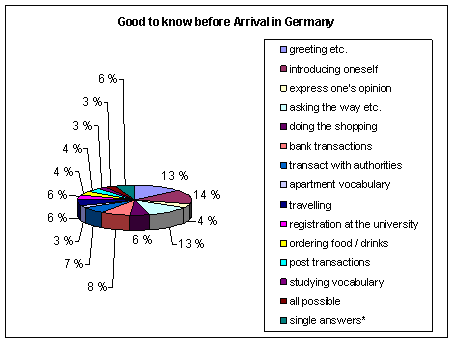
*doctor visits, coupling the phone, registration at the library, common
words, spoken language
Examples on good expressions which one should know before coming to Germany:
greeting etc.
- Guten Tag jne.
- Hallo / Tschüss / Bis…
- Wie geht's?
introducing oneself
- ich komme aus…
- ich studiere…
- Wie heißen Sie?
- Ich heiße…
express one's opinion
- Meiner Meinung nach…
- Da bin ich aber anderer Meinung…
asking information
- Wo ist…?
- Wie komme ich…?
- Wie geht/fährt man nach…?
- Könnten Sie bitte…
doing the shopping
- Was kostet das?
- Ich möchte…kaufen.
bank transactions
- Kontoauszugdrucker
- transact with authoroties Aufenthalterlaubnis
apartement vocabulary
- Miete
- Kaution
travelling
- Wochenendticket
- Nächste Haltestelle
- Der Zug hat…Verspätung
- Ich hätte gern eine Reisebindung nach…
ordering food / drinks
- Ein Helles, Bitte!
- Ein Döner,
bitte.
studying vocabulary
- Referat
- Schein
- Vorlesung/Seminar/Unterricht/Übung
- Studentenausweis
- Ausbildungkarte
- Studentenwohnheim
Good expressions in spoken language
- Ja klar / Alles klar
- Ach, so
- na ja / Tja
- Vielen Dank!/ Danke schön
- Guten Appetit
- Bitte!
- Keine Ahnung!
- Tut mir leid
- Entschuldigung/ Entschuldigen Sie…
- Guten Tag
- Ich kenne nur Bahnhof!
- bestehen aus
- Bescheid wissen
- Ich habe Durst
- Ich habe Hunger
- Ich habe Ausschlag, es juckt!
- Mensaessen
- Konservierungsstoff
- Was machst du heute Abend?
- Zulassungbescheid…!
- Sehr angenehm
- Darf ich mal durch?
- asozial
- genau
Other expressions
- Zeit ist Gold
- Ordnung muss sein!
- Was nicht erlaubt ist, ist verboten!
- Hals- und Beinbruch
- Kommt Zeit, kommt Rat!
2.
What is the most difficult aspect of the German language?
(multiple answers)
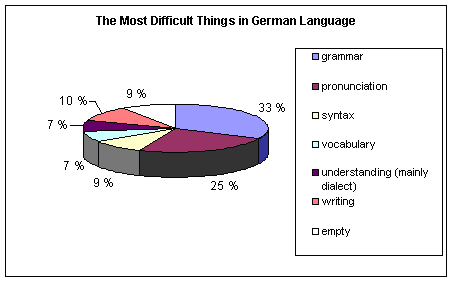
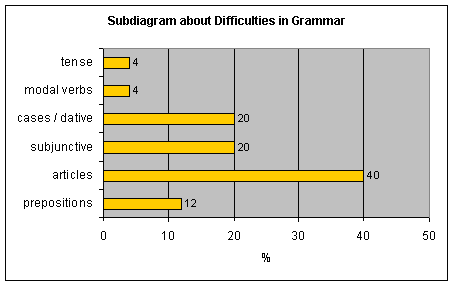
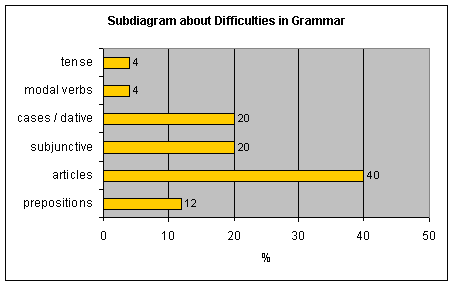
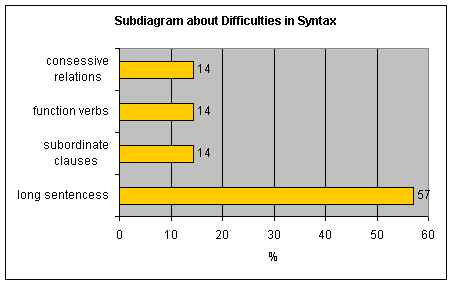
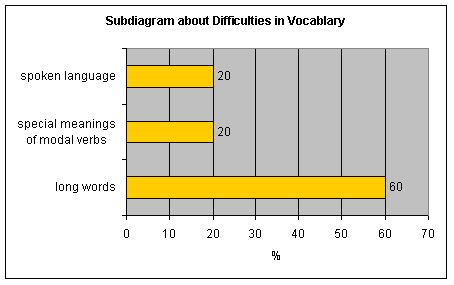
3. Other Comments
- “Wir
alle Sokates Studenten sind sehr beglücklich, weil man uns die
Möglichkeit gibt, andere Studierstil, Lebenstil etc. “von
Innen” kennezulernen. Das Erlebnis allen zu leben ist ganz anders
als, z.B. Deutschland auf den Urlaub als Turist kennenzulernen.”
We all Sokrates students are very lucky because we have the possibility to get to know other way of studying and living from “inside”. This experience is so much different than e.g. to get to know Germany as a tourist. (F22, Berlin/Spanien)
- “Tagen
sind langsam. Das ist dunkel um 3.30 und ich denke das ist 7. DANKE
zu die Erasmus Büro in Berlin. Sie sind sehr nett.”
Days are slow. It is dark at 3.30 pm. and I always think it’s 7 o’clock. THANK YOU for the Erasmus agency in Berlin. They are really nice. (F21, Berlin/Spanien)
- “Denn
die Deutsche Sprache ist so anders als die Englische Sprache mache ich
öfters Fehlern mit dem Grammatik während der Aussprache.”
Because the German language is so much different than English I make often mistakes when I speak. (M21, Dresden/USA)
- “Wir
sollten in Finnland noch mehr in Deutschstunden sprechen.”
We should talk more in German classes in Finland. (F24, Dresden/Finland)
- “Bin
mit der Studiensituation in grossen und ganzen zufrieden.”
On the whole I’m satisfied with the studying situation. (M24, Dresden/Mongolia)
- “Mit
den Deutschen ist es mir schwer Kontakt aufzubauen. Sie sind verschlossener
als die Menschen in unserem Land.”
For me it’s difficult to get to know the Germans. They are more introvert than people are in our country. (F22, Dresden/Hungary)
- “Ich
fühle mich wohl in diesem Land trotz der wenigen Ausländerfeindschaft.
Die Menschen sind gut und das Studium macht mir Spass.“
I enjoy being in this country despite of the miner enmity for foreigners. People are nice and I enjoy the studying. (F?, Dresden/?)
- “Es
gibt zu wenig Computer mit Internett Zugang an der Uni”.
There are not enough computers with an Internet access at the university. (F19, Dresden/the Netherlands)
A. Background Questions | B. Proficiency in German | C. Studying | D. Everyday Situations | E. Social life and leisure | F. Important Vocabulary